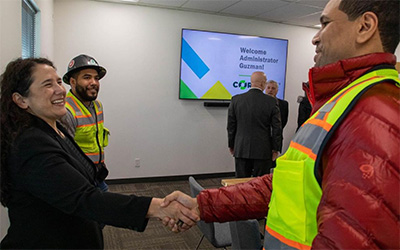The 27th Administrator of the U.S. Small Business Administration (SBA), Isabella Casillas Guzman, was in Vancouver and Portland on February 10th to visit small businesses and talk to their owners and local leaders. The City of Roses Disposal and Recycling (COR) was chosen as one of the Administrator’s stops as the company was a recent recipient of an SBA Small Business Innovation and Research (SBIR) Grant. The Administrator, along with representatives from the Federal and Regional SBA Offices, Prosper Portland and Virtue Lab, spent time with the team at COR. As an advocate for small business and having the ear of the President, the Administrator was warmly welcomed at our facility and we were happy to share how the grant will help our operations.
COR received the SBIR grant last month. Referred to as one of America’s Seed Funds, SBIR grants are meant to fund initiatives that increase private sector commercialization of innovation, stimulate technological innovation, and foster technology transfer between small businesses and research institutions. A key component is that the funds also foster participation by women and socially/economically disadvantaged individuals. COR’s application checked the boxes as we will use the money to research and develop software technology to track the supply chain of our solid waste and recycling operations better.
The grant funds will assist COR in standing up a Real-Time Recycling Inventory Management software to better capture information on our construction and demolition waste. It will allow COR’s material recovery facility to accurately evaluate the weight of waste entering the facility and track recovered materials inventories. The inventory tracking system will help to confirm the sale of recovered materials to end markets and allow waste generators to track the end-of-market destination for their waste. This will reduce the amount of recycling materials that inadvertently end up in landfills. While the basis for this grant is to implement the new system into our construction and demolition recycling process, if all goes well, the same program can be put into our residential recycling system to further stop unintended recycling materials from hitting the landfill. The better we are able to assure what can be recycled is recycled, the closer we get to our goal of zero waste.
 This leap into technology that we are now able to take is a result of a deep understanding of how our business operates and what can make it better. This knowledge also stems from our team’s constant attention to the latest available technologies and having the vision to see how we can improve to better clear our City of its waste. We simply believe that business as usual is not an option.
This leap into technology that we are now able to take is a result of a deep understanding of how our business operates and what can make it better. This knowledge also stems from our team’s constant attention to the latest available technologies and having the vision to see how we can improve to better clear our City of its waste. We simply believe that business as usual is not an option.
From that perspective, Administrator Guzman shares our philosophy. Discussing what we do and plan to do with the additional funding with the SBA Administrator was an honor. It was eye-opening from the perspective that COR shares similar concerns with Administrator Guzman about the lack of access to capital that minority-owned businesses face. As she has commented previously, that lack of capital costs the U.S. economy hundreds of billions of dollars in economic output. She wants to see equity across the government in how it works with the country’s 33 million small businesses.
At COR we also recognize the need to remove barriers that have prevented equal prosperity for minority-owned businesses and recognize that fostering public-private partnerships to promote the development of such businesses is a key factor. Being a recipient of a government grant allows us to take a small step in that direction. Through our business, as well as through our work with organizations such as Prosper Portland, Virtue Lab, and the newly formed Black Business Association of Oregon, we hope to spark more public-private initiatives that build economic equity. Together we can keep our economy humming and become the catalyst to Sustainable Economic Development.